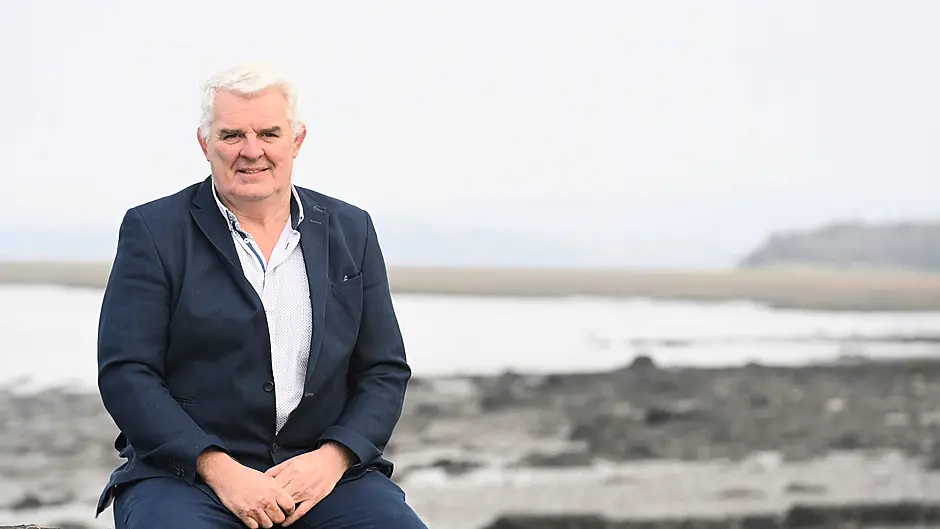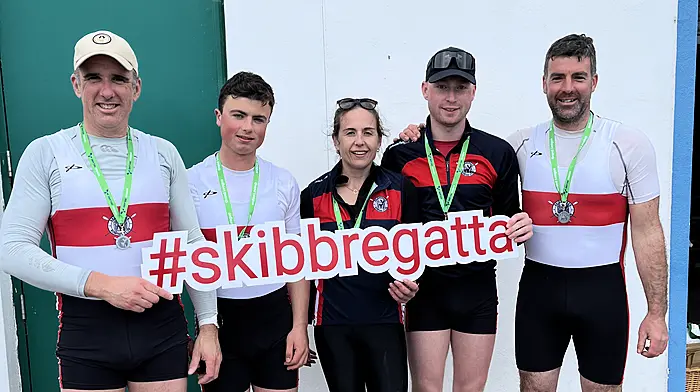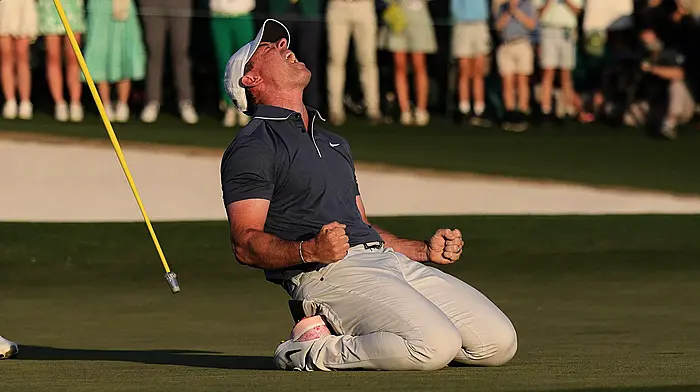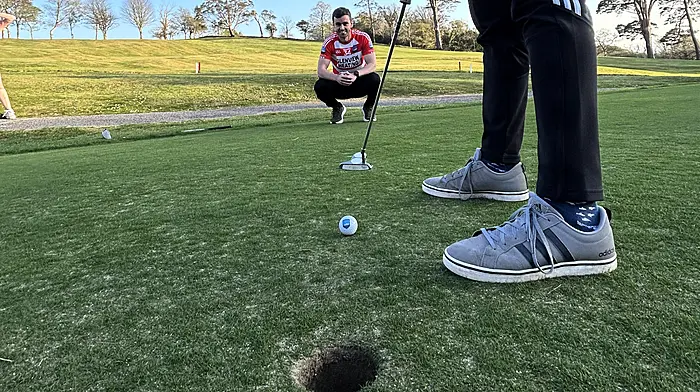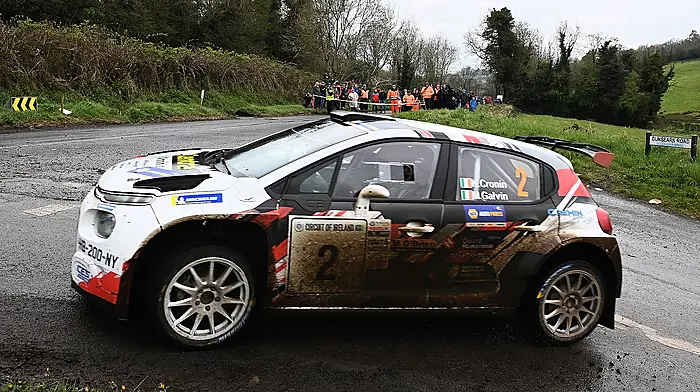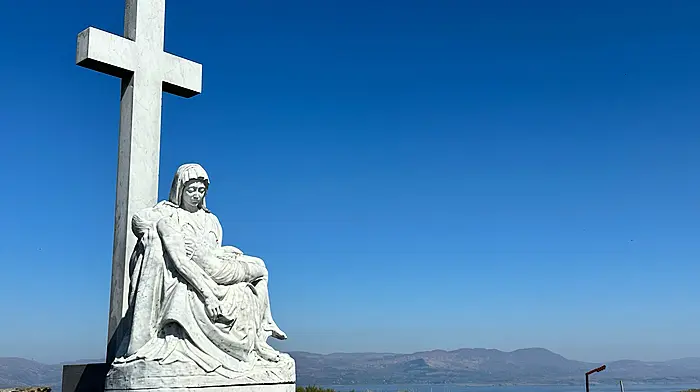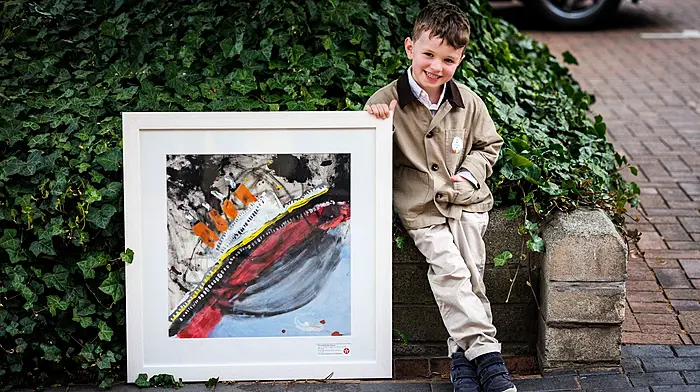In 2008 Finbarr Kearney was named on the best Munster team never to play for Ireland – but how close did the ‘monster from Munster’ come to winning an international cap in the 1980s? And just how good was he? KIERAN McCARTHY caught up with the charismatic Skibbereen man
**********
FINBARR Kearney is the local rugby legend that a generation has never heard of.
Long before the sport put down firm roots in West Cork soil, Kearney bulldozed a path from Skibbereen right up to Thomond Park.
During the 1980s he was West Cork’s best rugby player, impressed with Munster and was deemed unlucky to never win an Ireland cap.
In fact, back in 2008 the Irish Independent ran a feature titled ‘The best Munster team never to play for Ireland’. There, selected as the second row, was Kearney. The monster from Munster, as he had been christened.
‘A barrel-chested bruiser from Skibbereen, he was agonisingly close to a cap in the mid-1980s with a superb final trial. A magnificent scrummager who bolstered the Sunday's Well pack for many years,’ they wrote, a hat-tip to a man who already a Star at home in Skibb before his stock rose in rugby circles.
***
It was the late Southern Star editor Liam O’Regan who introduced Finbarr Kearney to rugby in the mid-1970s. Liam was rugby mad. Kearney was built for rugby. The maths was straightforward in this equation.
‘My mother got me a job interview for The Southern Star. Liam O’Regan rang me, interviewed me on a Saturday, I started as a compositor on the Monday, he asked me to come along to rugby training with Skibbereen on the Tuesday night and I played my first junior game the following weekend,’ Kearney recalls.
He was the perfect match for rugby. Having grown up on the farm at Hollybrook Estate in Skibb – his father Dan was the farm manager there – Kearney knew nothing but hard work. He grew up digging, pulling and tearing. He was making silage pits as a ten year old. That raw, agricultural strength and mindset stood to him on the rugby field. He was aggressive and fearless, too. At junior level with Skibbereen RFC he was a force. That’s also where he learned his trade as a second-row forward.
It wasn’t a surprise when a senior club, Sunday’s Well, showed an interest in him after they played Skibb in a Munster Junior Cup game in 1981.
‘Once I hit the senior ranks I went up the ladder very fast,’ Kearney says – and he took the step up in levels in his giant stride. That burst of pace he had was one of the weapons he unleashed on the rugby field. For a big man, coming in around 17 stone, he was light on his feet. He’d soft hands too, and that came from his GAA background with O’Donovan Rossa.
‘Finbarr is one of the best players to come out of Skibbereen Rugby Club,’ notes John Field, a lifelong member of the club.
‘He had it all, really. He was very strong, he had good football and he was lightning fast over 20, 30 yards. A great scrummager, a great man to have in a ruck and he was a hard man to bring down too.’
Armed with a skillset like that, Munster Rugby couldn’t look past Kearney – and they didn’t. But before he made his his Munster debut in an Interprovincial Championship clash with Ulster at Thomond Park in 1984, he was at full tilt on and off the field.
Still working in The Southern Star, Kearney made the regular trek from Skibb to Cork city for training and matches with Sunday’s Well, while he also played football for O’Donovan Rossa. It was heavy going, but he knew no other way. Hard work was the currency the Hollybrook man dealt in since he was a kid.
‘That’s how we were all brought up, to work hard,’ Kearney notes.
‘My brothers, Noel and Tadhg, and my sister, Mary, we had nothing else to do except work, night and day. That stood to us. You just get on with it.’
That appetite for work earned him a Munster debut in late ’84 when he was 26 years old and in his prime – and he grabbed his chance with those giant hands. Perhaps that opportunity could have come even earlier, but injuries had struck in previous seasons.
Munster lost to Ulster, 14-6, but Kearney was the big winner. It was a near-perfect debut. Irish Times rugby writer Edmund Van Esbeck was blown away by the performance of this unknown prospect from Skibbereen.
‘The Munster forwards devoured Ulster from the start with Donal Lenihan stamping his class and authority in the lineout and he received most able support from Brian Spillane and newcomer Finbarr Kearney,’ Van Esbeck wrote.
‘One must ask where Munster have been hiding this young man all season, for an able helper for Lenihan has been a chronic and obvious need. He could be on the foothills of a rewarding representative career bearing in mind the limited talents in the second row that exist in Irish Rugby.’
High praise, indeed.
‘It was a huge achievement for me to come from Skibbereen to play on a Munster team,’ Kearney reflects now.
‘We had Donal Lenihan, Tony Ward, Mick Bradley, we’d a good team, and Ulster were the other force at the time.’
Kearney was a feared force himself at the time too, shining for Sunday’s Well, and his stock was about to rise dramatically.
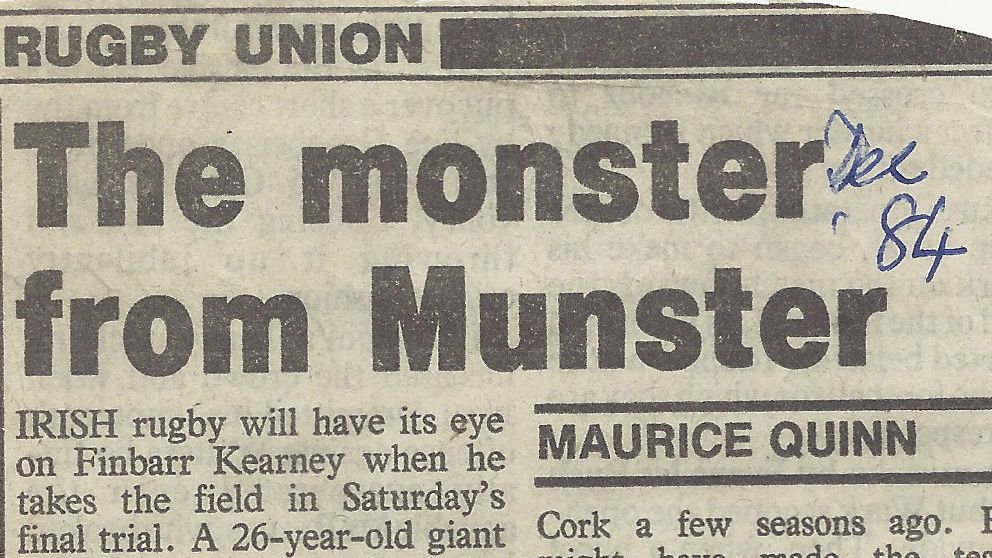 One newspaper famously described Finbarr Kearney as the 'monster from Munster'.
One newspaper famously described Finbarr Kearney as the 'monster from Munster'.
***
Days after his man-of-the-match performance against Ulster, Kearney was catapulted out of nowhere into the final Irish team trial at Lansdowne Road on December 22nd, 1984. Back then they were decisive in selecting Ireland squads.
Kearney was within touching distance of an Irish cap off the back of one game.
His all-action display for Munster had turned more heads then he realised. One national newspaper went as far to say ‘Some think he may emerge as the new Moss Keane’.
He was named second row on the Possibles team that would take on the Probables.
‘It all happened very fast,’ he says, and those who know the charismatic Kearney – who now, with his wife Gillian, owns and runs the popular Bramley Lodge on the way to Fota Wildlife Park – might be surprised to learn that, maybe, he was a bit overwhelmed by the speed of his rise.
‘In the space of a few weeks I made my full Munster debut and got called in for Irish trials.’
Still, he wasn’t lacking confidence. He backed himself and he held his own with the best in the country at those trials, was called regularly for Irish squad training, but he wasn’t involved as Ireland won the Triple Crown in 1985. He was on their radar, at least.
His form for Sunday’s Well and Munster over the next few seasons meant Kearney’s name was always in the conversation with Ireland. His second-row partnership with Donal Lenihan impressed, and there were some calling for the Munster duo to be paired together at international level. Lenihan has good memories of his time alongside Kearney.
‘The second row for Munster was always a competitive area so even getting selected for Munster that time was a fair accolade. No-one walked on to the team,’ Lenihan says.
‘Finbarr was a great competitor, a strong footballer and had a very good football brain. He was a big character, too.
‘He played a lot at Number 8 for the Well over the years. Even though he was big he was comfortable on the ball, with good hands, a good ball carrier. He was quite skilful for a big man. Maybe because of his ball carrying, his ball skills went unnoticed at times.’
There’s no doubt Kearney was knocking on the door with Ireland, especially ahead of the 1987 Six Nations when he was really in the mix, again.
But he feels he knows one reason that he didn’t hit the dizzy heights of winning an international cap. He could have done with an extra couple of inches in height.
‘The one failing I had was that I wasn’t great at the line-out,’ Kearney explains.
‘It was a standing start then. There was no lifting, you had to jump up. I was a better ground player, scrummaging. If you look at Lenihan he had the line-out ability that I didn’t have. That ability was very important at the time.
‘Was I near selection? Around 1986 and ’87 I was playing some of my best rugby and I had a reputation as a second row.’
The signs were positive, but then injury struck.
 Finbarr Kearney in his Munster days.
Finbarr Kearney in his Munster days.***
‘I got injured at the wrong times,’ Kearney laments, and Lady Luck packed her bags and deserted him in late 1987.
In an Interprovincial battle against Connacht he hurt his hand.
‘I had to come off at half time, and I think it was Mick Galwey, who was in his first year with Munster, who came on for me,’ he recalls.
‘The final Irish trial was a number of weeks after. I had to play in it because it was my only chance but I shouldn’t have played in it. The hand wasn’t right at all.’
Despite the injury – and having missed a few weeks of match practice – he played well in the trial, but didn’t get the nod for the following season’s Five Nations. Again, so close, but just not close enough.
At club level Kearney helped Sunday’s Well to two Charity Cup victories in a row in the late 1980s, and he won a Jury’s Hotel Sports Star Award in 1987 too, but as the pages of the calendar turned his chance to win an Ireland cap disappeared. Soon, life took over.
‘I was getting older, I’d had a lot of injuries and life was busy away from sport. I was still working in The Southern Star and I bought a pub in Skibb too, Kearney’s Well. I was looking at my future,’ he explains.
He eventually returned to Skibbereen RFC and he was back in the headlines again in 1992, but for a different reason: The Finbarr Kearney Saga.
He had dropped down to junior level so he could play with Skibb in the Munster Junior League, having played no game with his then old club, Sunday’s Well, since the previous season. But he was stopped from playing with his hometown club in all five cup competitions that season, all because of a technicality – he had come on as a sub for Munster against Connacht in an Interpro game in the 1990/91 season.
‘Imagine that, I was 34 at the time, back playing with Skibb to help us get going again and I wasn’t left play cup rugby all that season but they let me play in the league,’ he says, ‘and by then the legs were starting to give way as well.
‘I can’t complain too much, I had a great sporting career. I worked hard, I played hard. I played rugby for Skibbereen, Sunday’s Well and Munster. I played senior football with O’Donovan Rossa. I’d a great time,’ Kearney reflects – and it’s important to remember his story. Long before the current crop of local rugby stars, there were men like Kearney, Jim Sheehan of Bandon, and the great Bertie Smith from Timoleague who starred with Bandon RFC, Cork Con and Munster. These were the original rugby pioneers from West Cork.
Skibbereen had some very good players at the time who played junior but Kearney took it on a level, played senior, earned his place on the Munster team and knocked hard on the Ireland door. It didn’t open but it wasn’t for the lack of trying.
So, any regrets, Finbarr?
‘There’s a song, I Did It My Way and that’s the only way I knew how to do it,’ he says.
‘For a fella from Hollybrook to go all the way to Munster and to be so close in Ireland trials, it was some going. If I knew then what I know now maybe things could have worked out different, but there are no regrets.’
Kearney did it his way – and his legend is assured.

